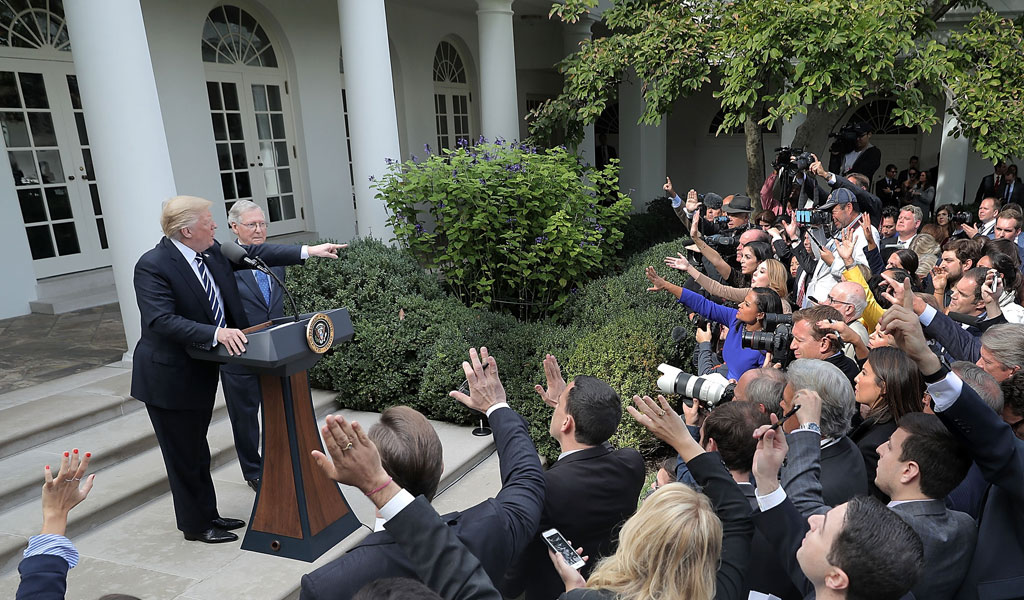
The media is missing a huge part of the controversy surrounding President Trump’s former campaign manager, Paul Manafort. While Manafort is reportedly expecting to be indicted for his ties to Russia, he has gotten barely any heat for lobbying on behalf of a Pakistani intelligence front linked to the Muslim Brotherhood and Hamas.
Manafort was Trump’s campaign manager from June to August 2016. He resigned after several reports surfaced about his business dealings with Russia and Russian allies in Ukraine, which may have included money laundering.
Manafort has reportedly been told to expect to be indicted.
After he resigned, Manafort continued to be seen at Trump Tower. After the election, he advised Trump on choosing members of his administration.
To date, almost all of the attention has been on Manafort’s ties to Russia because of its political impact. Few know that he lobbied—perhaps illegally—for a front for Pakistan’s terrorism-sponsoring ISI intelligence service and the Muslim Brotherhood/Hamas network in America.
Between 1990 and 1995, Manafort’s firm was paid $700,000 as the registered lobbyist for the Kashmiri-American Council. Its funding came from Pakistan intelligence as part of a political influence operation.
It was incorporated by a Pakistani spy, Ghulam Nabi Fai, who led the group until he was arrested in 2011.
The other incorporator was the wife of a senior official of the Islamic Society of North America (ISNA), a group labeled as an unindicted co-conspirator in a Hamas-financing trial. The Justice Department listed ISNA as an entity of the U.S. Muslim Brotherhood.
Fai’s partner in Pakistan, also an ISI intelligence operative, was so wrapped up in the jihadi world that he traveled to Afghanistan with a Pakistani nuclear scientist who had discussed nuclear weapons with Osama Bin Laden and Al Qaeda co-founder Ayman al-Zawahiri in August 2001.
A former senior Pakistani official with direct involvement in the political influence operation said, “There is no way Manafort didn’t know that Pakistani was involved with” the Kashmiri-American Council.
The official recalls flying to the U.S. from Islamabad to meet with the ISI spy, Ghulam Nabi Fai, at Manafort’s home. The purpose of the meeting was to “review strategy and plans” to influence Congress through the Kashmiri-American Council.
One of the objectives was to move U.S. attention “away from the involvement of Pakistan in sponsoring terrorism in Kashmir and elsewhere,” according to Gordon Kromberg, who prosecuted Fai, in 2012.
Campaign donations were a major part of Pakistani intelligence’s strategy, with at least $80,000-100,000 being allotted for it.
If Manafort did know that the Council was a front for the Pakistani government, then Manafort would have been required to register as a foreign agent of Pakistan.
When it first broke this little-noticed story, Yahoo! News pointed out that the Indian government accused the Kashmiri-American Council of being a Pakistani government front during the time in question.
India’s Foreign Ministry claims that Manafort and another member of his firm even went to Kashmir under the guide of being journalists as part of a “blatant operation” to produce anti-India propaganda.
Charlie Black, Manafort’s lobbyist at the firm, denied that they knew that the Kashmiri-American Council was linked to the Pakistani government. Black was an adviser to Ohio Governor John Kasich’s presidential campaign.
Manafort also had financial ties to the Pakistani government’s shady dealings beyond the Kashmiri-American Council.
As Yahoo pointed out:
In 2013 he acknowledged to French investigators that, in 1994, he had received $86,000 from two arms dealers involved in the sale of French attack submarines to Pakistan’s navy. The payments were part of an arrangement to compensate Manafort for political advice and polling he provided to French presidential candidate Édouard Balladur — one part of a wide-ranging French investigation into alleged kickbacks from arms sales dubbed by the French press “the Karachi affair.”
This story is especially relevant in light of Qatar’s hiring of conservative Republican political operatives as lobbyists, including several former senior aides to the Trump campaign.
Secretary of State Rex Tillerson also has strong ties to the Qatar regime, even serving on a board alongside Al-Jazeera officials.
Why is it that Manafort’s business ties to Russia get all the attention but his business with jihadists does not?
Once again, hyper-partisanship is blinding us to the whole scope of an important situation.
Most of the right-wing media doesn’t want to touch a story that reflects negatively upon President Trump’s inner circle and choices of who to surround himself with.
Most of the left-wing media doesn’t want to touch a story about Islamist political influence operations, as it would undermine their “Islamophobia” narrative. Further, they are absorbed in the Russia angle.
If the media put objectivity above its political narratives, Manafort’s case would show both sides the validity of concerns about Islamist and Russian influence operations. We don’t have to choose one and dismiss the other. Americans, and Westerners overall, should care about the full scale of both, which were aimed at all political parties.
The lack of attention paid to Manafort’s work for a Pakistani intelligence front linked to the Muslim Brotherhood/Hamas is a testament to how today’s political atmosphere is an asset for the Islamist cause.
RELATED
25 Reasons to Reassign General H.R. McMaster
